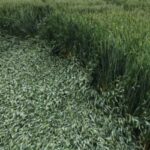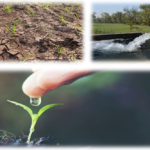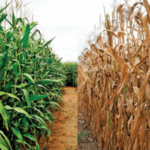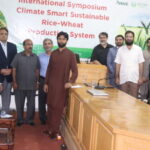Empowering Smallholder Farmers through Digital Advisory
Insights from SAWIE’s Collaboration with Bank Alfalah
Agriculture in Pakistan is undergoing a slow but necessary transformation. Facing growing climate risks, declining soil health and yield gaps, smallholder farmers remain at the center of the challenge and the opportunity. To address these systemic issues, SAWIE (Sustainable Agriculture and Water Intelligence Ecosystem), in collaboration with Bank Alfalah, launched a pilot project to demonstrate the power of climate-smart digital advisory services in transforming farming practices, improving livelihoods and supporting financial inclusion.
The Need for Innovation in Agriculture
Despite agriculture employing over 50% of Pakistan’s rural workforce, a large share of smallholder farmers remains disconnected from formal banking systems and quality inputs. Yields across major crops like wheat, rice and maize fall significantly short of potential due to lack of access to timely agronomic advice, certified inputs and financial tools.
Simultaneously, Pakistan’s agriculture sector contributes nearly one-third of national greenhouse gas (GHG) emissions. Addressing these challenges requires integrated solutions and that’s where SAWIE’s digital advisory platform enters.
Project Goals and Vision
The core objectives of this pilot project were to:
- Introduce digital farm advisory services to smallholder farmers associated with Bank Alfalah.
- Train Bank Alfalah staff to understand and support digital advisory services.
- Promote climate-smart practices that improve farm productivity while reducing environmental impact.
- Lay the foundation for scalable digital financial services in rural agriculture.
Training Bank Staff and Building Relationships
The success of digital advisory hinges not just on technology but on trust. SAWIE began training Bank Alfalah Relationship Managers in Lahore on June 1st, introducing them to the digital platform, agronomic tools and the importance of climate-smart interventions.
This training helped position bank staff as trusted intermediaries. Many later joined field visits, supported farmer mapping and facilitated advisory content delivery, reinforcing the importance of blended digital-human engagement in rural contexts.


Farmer Engagement and Field Training
Field-level training sessions were held at four branches in Sheikhupura District — Sheikhupura, Farooqabad, Muridkeand Mandi Faizabad — reaching over 130 farmers. Farmers were trained in topics including:
- Soil testing and fertilizer use
- Crop residue management
- Irrigation efficiency
- Pest and disease control
- Digital literacy and advisory app use
Through individual support and localized WhatsApp groups, SAWIE created tailored advisory flows, including weather forecasts, voice notes, fertilizer schedules and crop cycle alerts, all aligned to the local sowing calendar.
Climate-Smart Practices in Action
One of the key focus areas was discouraging harmful practices such as burning paddy straw, which contributes to smog, soil degradation and GHG emissions. SAWIE shared alternatives such as:
- Happy Seeder and zero-tillage technology
- Straw composting and mulching
- Using residues as livestock feed or industrial inputs
These practices were introduced gradually through simple messages and case-based learning, enabling farmers to understand both environmental and economic benefits.
Pilot Impact: Voices from the Field
Farmers responded positively to SAWIE’s timely, personalized advice. One notable case is of a rice farmer in Sheikhupura, who increased his yield from 40 to 60 maunds per acre, a 33% jump, after following SAWIE’s advisory from seed selection to harvesting.
Despite initial skepticism, many farmers grew increasingly responsive, joining WhatsApp groups and providing feedback. SAWIE’s approach of combining satellite-based NDVI monitoring, crop calendars and real-time support helped build credibility and impact.
Early Lessons and Future Pathways
Several important insights emerged:
- Trust-building is key: Farmers are more likely to engage when approached through familiar institutions like banks.
- Digital alone is not enough: Human interaction, local language communication and relationship continuity remain essential.
- Low digital literacy is a barrier: Simpler tools like WhatsApp banners and voice notes proved more effective than app-based interfaces.
- Data is power: Field mapping, crop health monitoring and farm profiling enabled more targeted support and opened new opportunities for credit risk assessment.
Unlocking New Business Opportunities
The pilot also uncovered strategic business insights for Bank Alfalah, including:
- Pre-profiling of farmers for enhanced credit risk management
- Enabling data-backed agri-loans and e-WHR adoption
- Bundling services like input access, soil testing and mechanization financing
- Supporting the bank’s ESG and green financing goals
These insights point toward a viable and scalable model for digital agribusiness services in Pakistan.
The Way Forward: Scaling with Purpose
This pilot project confirmed that a hybrid model that combines digital tools, human touchpoints and climate-smart principles can build farmer trust, improve yields and create new avenues for inclusive finance.
SAWIE now proposes a cluster-based model around selected Bank Alfalah branches. With dedicated field teams, localized advisory and bundled services, this model can enhance adoption, reduce overhead costs and strengthen long-term farmer-bank relationships.
From this foundation, there is strong potential to scale services to other districts and regions, creating a more resilient, productive and climate-aware agriculture system across Pakistan.
Top Blogs




